There’s
a romance associated with train journeys. There’s a certain nostalgia for the
days of my youth when we travelled regularly by train, whether it was from
(then-) Madras or Bangalore to Kerala where my grandparents lived, or whether
it was elsewhere on vacations. I’m old enough to remember the first class
cabins that each had its own bathroom and opened out directly onto the station.
I was a wee child then. And of course, we usually travelled second-class
anyway, arriving sooty and grimy at our destination. I still remember pressing
my face against the window bars so I could see the engine whenever the tracks
curved. I can recall the change in the sound of the railway carriages over the
tracks when it went over water bodies. I remember seeing the black smoke rise
from the steam engines, only to turn lighter as it dispersed against a blazing
blue sky.
My
favourite pastime was to grab a window seat and gaze at the countryside
thundering past our windows until one or the other of my siblings would push me
away to take my place. Then, armed with the books that my father always bought
us at the Higginbothams’ stall at the station, I would proceed to clamber up to
the topmost berth where I could stretch out and read in peace. I even loved
sleeping on the train – the rolling motion of the carriages was like being in a
rocking chair, and the clickety-clack of the wheels on the tracks were my
lullaby.
I also associate
railway journeys with eating! While my mother carefully packed food for the
entire journey, what I liked most was eating the food that the vendors sold,
either at the station, or sometimes even on the train. And since my father
would buy us anything we wanted to eat, and there were three of us kids, we
were well supplied with comestibles, as Billy Bunter would have put it.
Most importantly, we
came in contact with a variety of people from disparate backgrounds. Spending
so much time together in the cramped confines of a train compartment meant that
interesting conversations were struck up, friendships – transient or otherwise
– forged, and the tedium of long train journeys in the heat of the summer
pleasantly alleviated by shared experiences. Uunfortunately, like ‘ghoda-ghadi
songs’, ‘piano songs’, or ‘picnic songs’, train songs too seem to have become extinct
in Hindi films.
I still love the
trains. But since we always seem to be rushing about when we travel to India, time
and convenience take precedence, and trains remain nostalgic memories. To
commemorate those memories and to hark back to a time when trains were a common
sight in Hindi films, here’s a list of ‘train’ songs in no particular order,
though my favourites cluster towards the top. My only criteria for this was
that the person singing the song had to present on the train (or on top of the
train) for the entirety of the song.
Apni to har aah ik toofan hai
Kala Bazar (1960)
Singer: Mohammed
Rafi
Music: SD Burman
Lyrics:
Shailendra
Dev Anand and
Waheeda Rehman. Having fallen in love (or attracted to) Alka (Waheeda) at first
sight, Raghu (Dev) has been following her around, trying his best to get
acquainted with her. He even follows her to Ooty where her parents are taking
Alka for a holiday. Perched on the berth below Alka’s, Raghu begins to sing.
Shailendra’s impish lyrics are a delight – neither Alka nor her parents are
sure whether Raghu is referring to god or trying to flirt with Alka. She sits
up, displeased, when he sings: Apni to har ik aah ik toofan hai/Uparwala
jaan kar anjaan hai, but he’s closed his eyes devoutly, and Alka sinks back
into the berth. And Raghu? He’s innocence personified.
Hai apna dil toh awara
Solva Saal (1958)
Singer: Hemant
Kumar
Music: SD Burman
Lyrics: Majrooh
Sultanpuri

Dev and Waheeda
again. This time, it’s not a flirtation, overt or covert. Laaj (Waheeda) is
eloping with her boyfriend. Prannath Kashyap (Dev), is a down-on-his-luck reporter,
looking for a scoop. And hearing Laaj’s and her boyfriend’s conversation,
Kashyap’s ears perk up. Meanwhile, Gogi (Sundar), a freelance photographer and
Kashyap’s friend is wondering to himself why no girl ever finds him handsome
enough to fall in love with him. And Kashyap? Why, he’s a handsome fellow,
isn’t he? Why hasn’t he fallen in love yet? Because his heart is a
vagabond, says Kashyap. Who knows who it will settle upon? A debonair Dev, a
pretty as a picture Waheeda, SD’s music, Hemant’s singing and Majrooh’s
delightful lyrics – what’s not to love about this song?
Raahi matwale
Waris (1954)
Singers: Talat
Mahmood, Suraiya
Music: Anil
Biswas
Lyrics: Qamar
Jalalabadi
A young and handsome
Talat Mahmood plays hero to a beautiful, sprightly Suraiya but this song is not
a romantic number. A young man travelling by train, looking out of the window
at the dark night, is inspired to break into song. His spirit embraces the dark
clouds, the bright moon, the cool breezes… Dekh dekh chakori ka man hua
Chanchal /Chanda ke mukhde pe badly ka aanchal /Kabhi chhupe kabhi khi roop ka nikhaar... A young woman, awakened
by his song, listens intently, and almost without meaning to, joins in. Dil
ne suni kahin dil ki pukar… The violins and the violas give you the sensation
of being on a train even if you do not see the clip.
Dekhoji ik bala jogi
China Town (1962)
Singer: Mohammed
Rafi
Music: Ravi
Lyrics: Majrooh
Sultanpuri
Another ‘pretend-to-be-devout-while-flirting-with-girl-under-the-nose-of-her-parents’
song. Only, being Shammi Kapoor, he has to be more flamboyant. Unlike Alka’s
parents in Kala Bazar, here, Rita’s (Shakila) father (SN Bannerjee) not
only knows who Shekhar (Shammi Kapoor) is, but thoroughly disapproves of him as
Rita’s suitor. So, Shekhar is left to find inventive ways to meet his beloved.
Now, Rita’s father is taking his daughter to Calcutta where she can be married
off to a more suitable man. So Shekhar follows. On the same train. In the same
compartment. In disguise. Complete with an iktara in hand. And while his
prospective father-in-law enjoys Shekhar’s song, Rita is quite irritated by his
constant nudging of her – that is, until she twigs who he actually is. (Unfortunately,
so does her father.)
The male version of
this song (sung by Mukesh) is the more popular one, but Lata’s version fits the
theme better. Strangely enough, this version actually comes earlier in the film.
The whole song is filmed in a train compartment as a lovely Sadhana tries to
convince Raj Kapoor that she loves him very much indeed.
Cheel cheel chillake kajri sunaayeHalf Ticket (1962)Singer: Kishore
KumarMusic: Salil
ChoudharyLyrics: Shailendra Another ‘train song’
that is not very romantic, but unlike Raahi matwale, Cheel cheel chillake
kajri sunaaye is sung by a man (Kishore Kumar) who spends the best part of
the film masquerading as an overgrown child. (No, it isn’t funny.) Sung by the
inimitable Kishore himself, Shailendra’s inspired nonsense verse manages to
sneak in a few satirical references to the state of the world. Salilda’s music trips
on its own journey, and Kishore gives full rein to his lunacy here, both in the
acting and the singing.
Gaya andhera hua ujaala
Subah ka Tara (1954)
Singers: Talat
Mahmood, Lata Mangeshkar
Music: C Ramchandra
Lyrics: Noor
Lakhnavi
A soulful Talat-Lata
duet, this song is not so much romantic as it is full of hope – for a new
tomorrow, a brighter future… Picturised on Pradeep Kumar and Jayashree, the
songs were the only silver lining in a dismal, mess of a film. (This was
especially strange given that the director was V Shantaram who had several
progressive, socially-conscious films to his credit.)
Hum ko samajh na lijiye
Kalpana (1960)
Singer: Asha
Bhosle
Music: OP Nayyar
Lyrics: Raja
Mehdi Ali Khan
What does a young
woman do when the other occupant of her first class compartment happens to be a
strange young man? Well, warn him off, of course, though most women would try
and look as inscrutable and reserved as possible. Not our heroine, of course.
She jumps down from the upper berth and tells her co-passenger off in no
uncertain terms – don’t think of her as a delicate flower; she’s perfectly
capable of handling him and any attempts he may make to flirt with her. Ashok
Kumar looks alternately bemused, amused and impressed by her song and dance
routine.
Dhak dhak karti chali
Dilruba (1950)
Singer: Geeta
Dutt
Music: Gyan Dutt
Lyrics: ?
Another train song,
another dance inside the compartment, though Rehana is rehearsing on her way to
a show. Her troupe of musicians provide the musical accompaniment to her dance.
I haven’t watched Rehana in a lot of films and haven’t really liked her acting
much in the ones I have watched, but here in this song, she’s sprightly
and vivacious, and I found myself liking both her and the song very much. (The
film, starring a very young and very handsome Dev Anand, was rather
entertaining, though like a lot of films both past and present, lost its way
midway.)
Chaiyya chaiyya
Dil Se (1998 )
Singer:
Sukhvinder Singh, Sapna Avasthi
Music: AR Rehman
Lyrics: Gulzar
“Duniya ki sab se
chhoti prem kahani hogi” quips Amarkant Varma (Shah Rukh Khan) when he runs
into a mysterious, beautiful young woman at Haflong railway station. Sipping
the chai she had sent him to get while she boarded a train, he waits to board
the next one. And as he waits, comes another train with people on top – so, of
course, he joins them. His infatuation with the woman he’s met for a brief
moment finds expression in another woman’s song: Jin e sar ho ishq ki chhaon/Paaon ke neeche jannat
hogi…
The lyrics were revised
from Bulleh Shah’s original verse (upon meeting his estranged guru, Shah Inayat
Qadri) that began O tere ishq nachaaya kar ke thhaiyan thhaiyan) by Gulzar,
who infused Sufism into his verses. Sung beautifully by Sukhvinder and Sapna,
and one of Farah Khan’s best-choreographed dances, the song is beautifully
picturised on the top of a train as it meanders through the countryside.
Dhanno ki aankhon mein
Kitaab (1977)
Singer: RD Burman
Music: RD Burman
Lyrics: Gulzar
Gulzar’s masterful and
insightful treatise captures the innocence of childhood without the cloying,
diabetic sweetness of Hindi cinema’s usual ‘grownups-in-kids’-bodies’ portrayal.
Master Raju’s innocent charm pervades the film as little Bablu struggles to fit
into a world he’s not familiar with. When he finally gives up the struggle and
runs away, he meets a sundry group of kindly, endearing and/or quixotic
characters. One of them is Ram Mohan, the happy-go-lucky driver of the train on
which Bablu stows away (sitting on a stack of coal). It’s a stressful job, and
the driver keeps up his spirits by singing of his love for his wife.
Kasto mazaa he relaima
Parineeta (2005)
Singers: Sonu Nigam,
Shreya Ghoshal
Music: Shantanu
Moitra
Lyrics: Swanand
Kirkire
One of my favourite
songs from contemporary Hindi films (the entire score, actually), Kasto maza
hai railaima really captures the joy of travelling on a train before the
lyrics segue into a romantic song about seeing his beloved wherever he looks. The
icing on the cake is the chorus by the children. Picturised on the famous toy
train that winds down the hills from Darjeeling, the song features a handsome
Saif Ali Khan and a very pretty Vidya Balan in her debut film.
Have you loved
travelling by train? Share your memories and your favourite train songs in the
comments below.

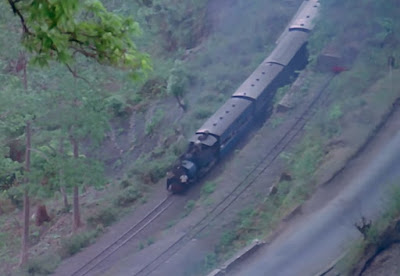




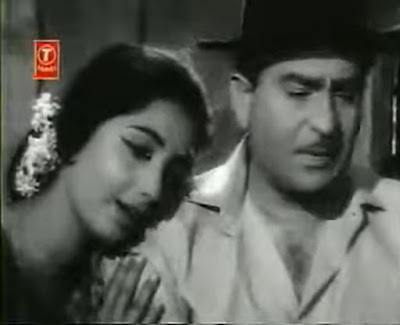
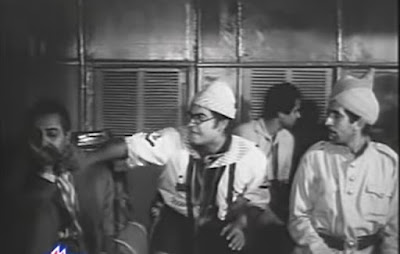
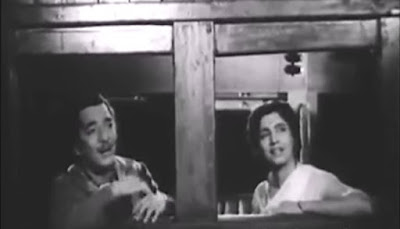
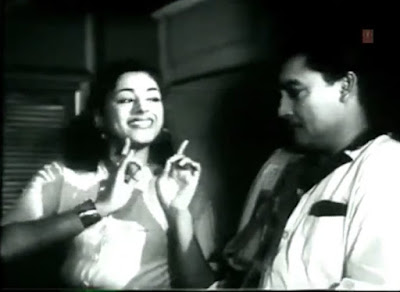


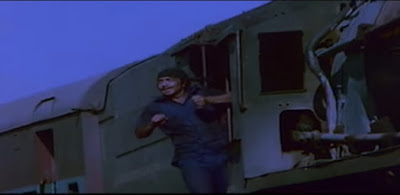

No comments:
Post a Comment